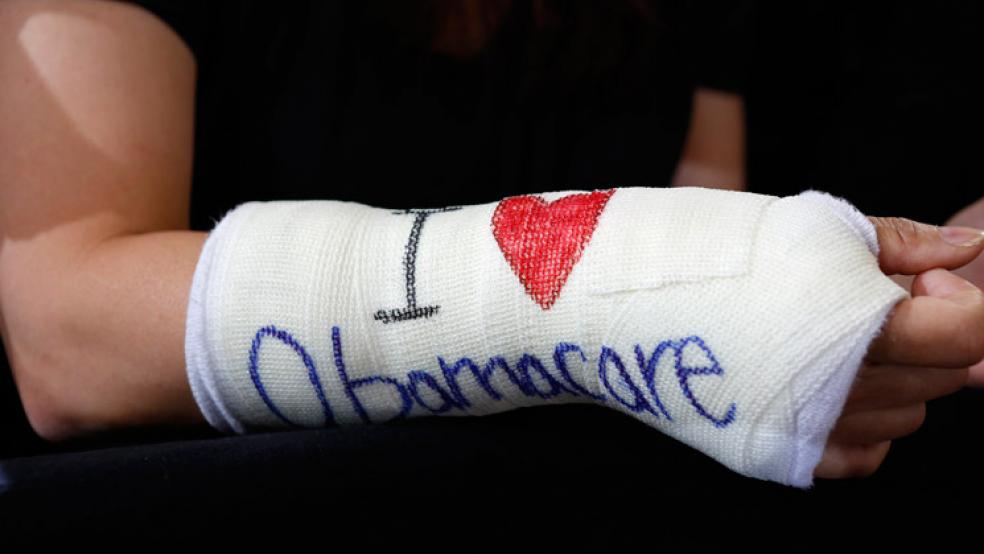A little more a month after UnitedHealth Group, the nation’s biggest health insurer, said it would expand its presence in Obamacare exchanges, the company is now saying it is pulling back on marketing its exchange plans and is considering withdrawing entirely from the program.
“In recent weeks, growth expectations for individual exchange participation have tempered industrywide, co-operatives have failed, and market data has signaled higher risks and more difficulties while our own claims experience has deteriorated, so we are taking this proactive step,” UnitedHealth Group CEO Stephen J. Hemsley said in a statement (PDF).
Related: Democrats Begin the Long, Tortuous Retreat from Obamacare
A UnitedHealth spokesperson emphasized that no definite decision has been made to exit the exchange business, and that the company will evaluate the viability of the Obamacare segment of the market over the first months of 2016.
Whether UnitedHealth ultimately leaves the exchanges or not, the announcement is a sign of how insurance companies are struggling to earn a profit from participating in the exchanges — and a sign of how those struggles could threaten the health care reform. UnitedHealth has been the “most cautious and prudent in terms of their strategy of dealing with the public exchanges,” said Morningstar analyst Vishnu Lekraj.
“If one of the largest and presumably, by reputation and experience, the most sophisticated of the health plans out there can’t make money on the exchanges, then one has to question whether the exchange as an institution is a viable enterprise,” Sheryl Skolnick, an analyst at Mizuho Securities, told Bloomberg.
Obamacare had been heralded as a potential boon to major insurers, given the millions of new customers it would add to their rolls. It hasn’t worked out that way thus far, at least for UnitedHealth. Though nearly 10 million people bought coverage for 2015 as of June through the federal and state-run Obamacare exchanges, including more than 500,000 who have gotten plans from UnitedHealth, those new enrollees have in many cases been more expensive and less profitable.
UnitedHealth said, for example, that some enrollees have signed up for insurance, gotten medical care and then dropped their coverage. In all, the company expects to lose up to $500 million on the Obamacare plans it has sold and said it would book $275 million of those losses in the fourth quarter. The company also lowered its 2015 earnings guidance to investors and analysts, largely as a result of the poor profitability of the Obamacare plans.
The fear is that if insurance companies can't generate enough profit from the exchange plans they offer, they'll raise premiums to levels that would dissuade people from enrolling, further reducing any profits and causing Obamacare to spiral into disarray.
Although Lekraj said it wouldn’t surprise him if other insurers choose to pull out if the losses continue, other experts aren’t so sure.
“This is just one little thing that happened,” said Deborah Freund, a health economist at the Rand Corporation. “Next year it’ll be something else. It’s unrealistic to think that there won’t be growing pains. To think that United not participating, basically when it hasn’t been before, isn’t a big thing to worry about.”
Freund added that other insurers won’t be so quick to leave the exchange because it’s too big a slice of the market. And if UnitedHealth does decide to leave, she said, other insurers could benefit if reduced competition allows for higher premiums. “It’s better for the public if they do participate because of the lower premiums, but that doesn’t mean a death knell for the insurers that do participate,” Freund said.
While Freund acknowledged that Obamacare is evolving and still working out its kinks, she compared the program to Medicare and Medicaid — programs that are still being tweaked on an ongoing basis 50 years after their inception.
Related: Obamacare’s Bait and Switch Has Left Consumers Scrambling in 2016
As insurers adjust to the market — and the newly insured who flocked to get medical care for their untreated health issues begin to get healthier — the profitability of the exchange will improve, according to Freund. She adds that the number of younger people who are choosing to enroll is larger than it was when the Obamacare exchanges first opened. As that demographic continues to increase its presence in the program, it’ll help reduce costs for insurers because those younger adults typically require less care than older enrollees.
Those reasons for optimism still can’t change the fact that several other insurers are, for now, also experiencing problems with the exchange, and UnitedHealth’s move might inspire them to reconsider their options.





